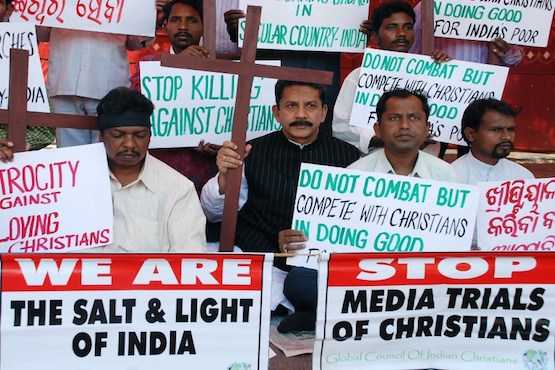
Indian Christians hold placards and crosses as they protest anti-Christian violence in front of Odisha state secretariat in Bhubaneswar in this 2007 file photo. (Photo by AFP/STR)
An Indian media report in early January caught Christians off guard. It said that the hard-line Hindu group, the Rashtriya Swayamsevak Sangh (RSS national volunteer corps) was planning to launch a political forum for Christians. Two meetings in December, where pro-Hindu politicians and church leaders were involved, were projected as proof of Christians collaborating with the Hindu group.
The official church has denied any involvement in the reported attempts for a political forum, but the reports have created enough confusion among ordinary Christians.
They are confused because media reports highlighted involvement of top ministers of India's pro-Hindu Bharatiya Janata Party (BJP, Indian people's party) government with Christian leaders on two occasions. Home Minister Rajnath Singh was chief guest at a Dec. 17 Christmas gathering that the Catholic Bishops' Conference of India organized. Finance Minister Arun Jaitley hosted a Christmas party for Christian leaders including Cardinal Oswald Gracias of Mumbai, a member of Pope Francis' advisory council.
The BJP, which came to power in 2014 to form the federal government, is the political wing of the RSS that Christians hold responsible for the many attacks on the Christian community.
So where do Christians stand? Should they or their leaders dialogue with the RSS, which officially has no role in the government? Or should they discuss issues with only elected representatives in the government? It is a hard question considering that the RSS drives the government, albeit unofficially and Prime Minister Narendra Modi was a top RSS official before taking up an active political role.
Confused leadership
The dialogue between the RSS and church is not new. It formally began after a series of attacks Hindu groups mounted on hapless tribal Christians in Gujarat in 1998. The BJP was also in power in New Delhi then. The church leadership did not know how to respond and decided to dialogue with the RSS.
Since then there were at least eight meetings — three rounds of talks in 2001 and one in 2002. The next meeting came six years later in 2008, when they had two rounds of meeting. Besides this, a Vatican delegation led by Cardinal Jean Louis Tauran, head of the pontifical council for interreligious dialogue, also had meetings in 2009 and 2011.
Other than wasting the collective money and time of the church in India, these dialogues accomplished little. No statements or conclusions of these dialogues were published and the violence on Christians continued unabated in several parts of India.
A few self-serving individuals and Christian leaders are stressing the need for engaging with the RSS. But Indian Christians — which include Catholics, Orthodox, Protestants and Pentecostal churches — are yet to have a unified body or authority making decisions on such issues.
Futility of dialogue
The futility of such dialogue is clear from past experiences. Christian leaders who attended past dialogues say the Hindu group has only one demand in such programs: stop conversions and missionary activities.
The RSS mouthpiece Organiser continues to publish articles distorting the history of Christianity and demanding an Indian church based on Hindu culture.
It insists that evangelization attempts should stop and every Indian Christian accept Hindu culture along with all its traditions, customs and social systems. That would mean accepting Hindu culture defined and dictated by the high caste-dominated RSS.
In that system, tribal people and lower castes will be treated as subhumans lacking basic human rights. They will be exploited and their women and children abused. All, including Christians, are supposed to accept this.
Common ground
For a dialogue to be fruitful, the partners need to have mutual respect and trust. There should be some common ground on which the parties can stand and dialogue to sink their differences.
The RSS asserts the commonality is India and its culture, which it interprets as Hindu. Christians are pushed to dialogue because they want to end the violence. The RSS asserts that violence is the "natural result" of conversion activities and will stop naturally when missionaries stop conversions, accepting the Hindu hegemony.
The church's teachings have at all times stressed the need for dialogue. Pope Francis continues to stress the dialoging aspect of the church in the modern world. In his 2013 letter Evangelii Gaudium (The Joy of the Gospel) on the proclamation of the Gospel in today's world, Francis presents dialogue as the best method to resolve conflicts. The church's teaching also exhorts to work for justice to bring about lasting peace.
But a dialogue that forces to accept the unacceptable cannot be called dialogue. The church is a religious organization and it has no political aspirations. But the RSS has high political interest and its ideology is fascist. Can the church dialogue with a fascist organization?
The best option for Indian Christians and the church is to join Indian social mainstream and true secular and democratic organizations to fight for the rights and freedom of all oppressed people. That would expose and isolate the oppressive hard-line groups.
Father Ajay Singh is a human rights activist working among the victims of anti-Christian violence in eastern Indian Odisha state where he also coordinates the Catholic church’s social work.


